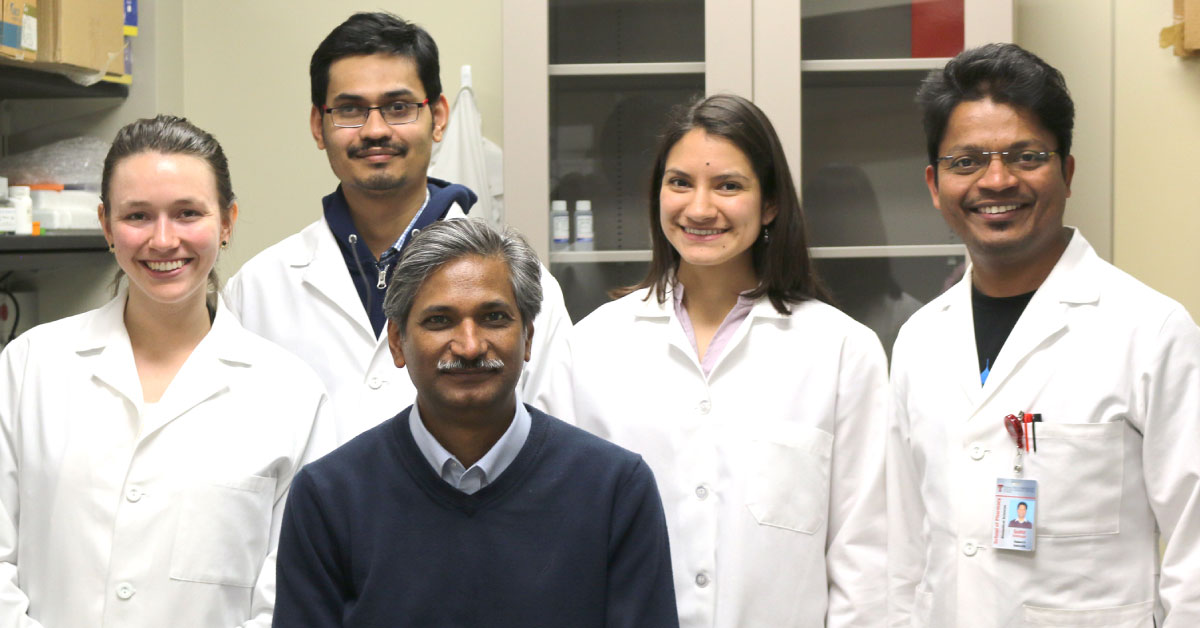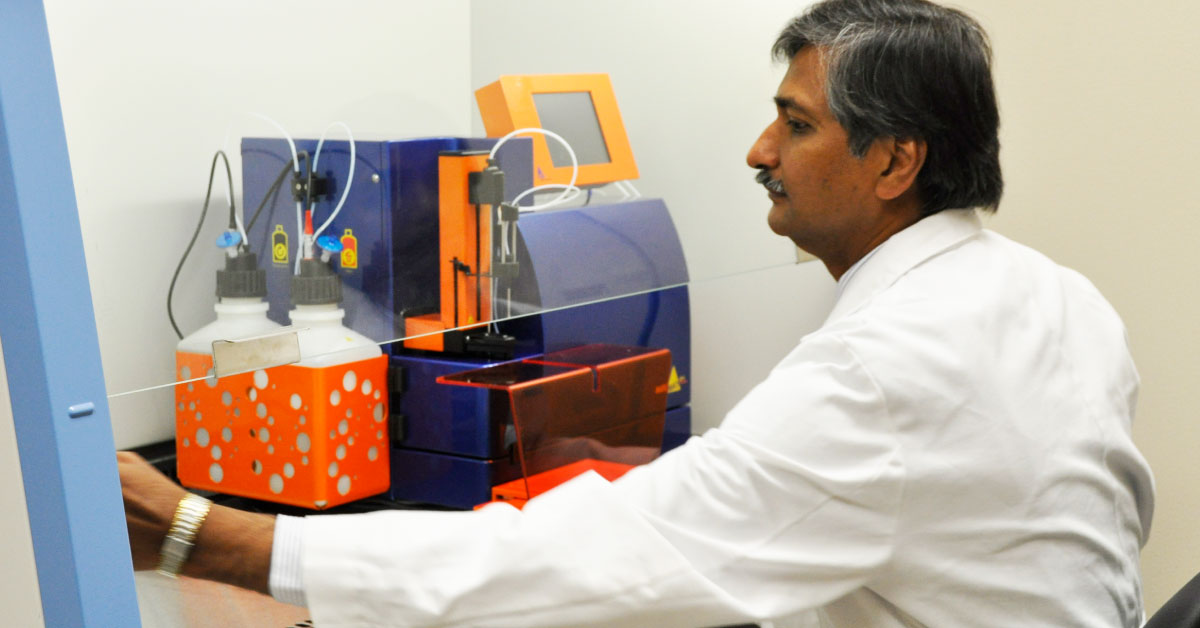Das Research Published in High-Impact Journal

Das and students.
A research paper authored by Hiranmoy Das, Ph.D., a professor for the Department of Pharmaceutical Sciences at the TTUHSC Jerry H. Hodge School of Pharmacy, has been accepted for publication by Autophagy, the top-ranking journal related to autophagy research with a current impact factor of 11.10. The paper is titled, “KLF2 (Kruppel like factor 2 [lung]) regulates osteoclastogenesis by modulating autophagy.”
“Any research findings published in this journal get the highest desired attentions from the readers and scientists interested in this field of research,” Das said.
Within our bodies, a process known as transcription allows the DNA sequence from a gene to be copied, or transcribed, into an RNA molecule. It is an important step by which information taken from the gene is used to produce a protein. The viability of this process is strongly influenced by transcription factors that make sure the right genes are expressed in the right cells at the right time.
It is one of these transcriptional factors—known as the Kruppel-like factor, or (KLF) 2— that regulates monocyte activation, function and their differentiation toward osteoclasts, which are important cells that break down bone tissue and release the minerals to maintain bone homeostasis. When osteoclasts increase in number or become hyperactive, it can adversely affect bone density and quality and lead to the development of conditions like arthritis and osteoporosis.
More than a decade ago, Das started investigating (KLF) 2 as it relates to the development of rheumatoid arthritis. Though his research, he discovered that (KLF) 2 also regulates the differentiation of monocytes, the largest type of white blood cell in our immune system that fights off bacteria, viruses and fungi. Das says (KLF) 2 regulates monocyte differentiation through a process known as autophagy, an intracellular repair mechanism by which damaged, specialized structures living within the cell are swallowed up by the cell.

Das in the lab.
The Das lab was the first to show that KLF2 is expressed in monocytes and is able to regulate monocyte activation and function. Those results were published in 2006 by the Proceedings of the National Academy of Sciences of the United States of America, a peer-reviewed multidisciplinary scientific journal.
“Subsequently, we have shown that KLF2 regulates osteoclast differentiation and function during rheumatoid arthritis in several other articles,” Das explained. “However, it was not clear how KLF2 was regulating osteoclast differentiation of monocytes. We show in this latest manuscript that KLF2 regulates osteoclast differentiation via controlling autophagy process, more precisely, targeting autophagy-related molecules.”
As he continues with his research, Das said the long-term goal is to control rheumatoid arthritis by regulating or adjusting KLF2 or it’s targeted molecules.
“If we can regulate uncontrolled osteoclastic differentiation of monocytes, which are responsible for damaging bones and cartilages, we might be able to manage not only all forms of arthritis, but also osteoporosis,” he added.
Related Stories
Celebrating Veterans: TTUHSC’s General Martin Clay’s Legacy of Service and Leadership
From his initial enlistment in the Army National Guard 36 years ago to his leadership in military and civilian health care management roles, Major General Martin Clay’s career has been shaped by adaptability, mission focus and service to others.
Texas Tech University Health Sciences Center School of Nursing Named Best Accelerated Bachelor of Science in Nursing Program in Texas
The TTUHSC School of Nursing Accelerated Bachelor of Science in Nursing (BSN) program has been ranked the No. 1 accelerated nursing program in Texas by RegisteredNursing.org.
TTUHSC Names New Regional Dean for the School of Nursing
Louise Rice, DNP, RN, has been named regional dean of the TTUHSC School of Nursing on the Amarillo campus.
Recent Stories
The John Wayne Cancer Foundation Surgical Oncology Fellowship Program at Texas Tech University Health Sciences Center Announced
TTUHSC is collaborating with the John Wayne Cancer Foundation and has established the Big Cure Endowment, which supports the university’s efforts to reduce cancer incidence and increase survivability of people in rural and underserved areas.
TTUHSC Receives $1 Million Gift from Amarillo National Bank to Expand and Enhance Pediatric Care in the Panhandle
TTUHSC School of Medicine leaders accepted a $1 million philanthropic gift from Amarillo National Bank on Tuesday (Feb. 10), marking a transformational investment in pediatric care for the Texas Panhandle.
Texas Tech University Health Sciences Center Permian Basin Announces Pediatric Residency Program Gift
TTUHSC Permian Basin, along with the Permian Strategic Partnership and the Scharbauer Foundation, Feb. 5 announced a gift that will fund a new pediatric residency.
